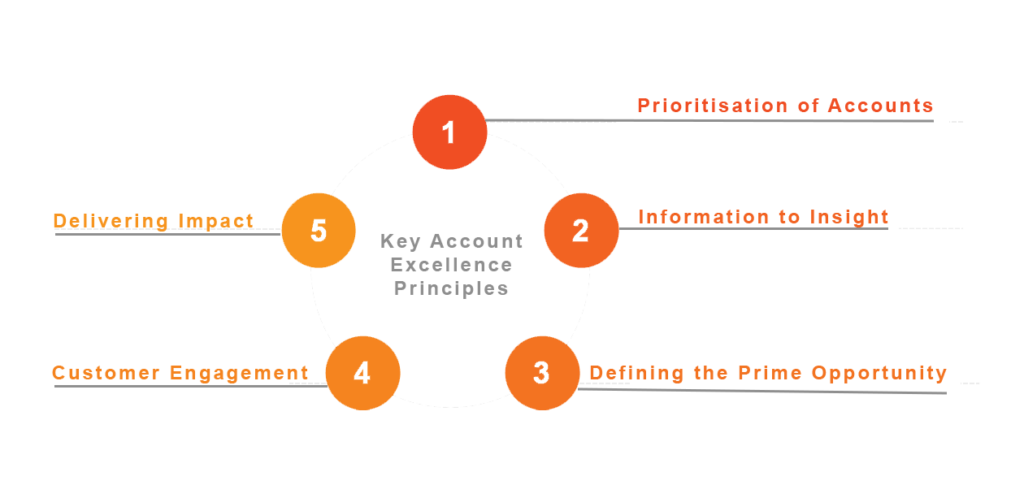
Dramatic changes in the health provider landscape have set a challenge for pharmaceutical companies. They urgently need to revise the way they relate to their customers and adopt a new approach which is generally termed Key Account Excellence.
This involves radically transforming the way a company does business. To support the process, Rubica has developed a structured programme and framework (Fig.1) that addresses the significant practical issues. It’s informed by over 20 years’ experience as an organisational change consultancy to some of the sector’s major players.
Fig.1

The framework’s first stage is the Prioritisation of Accounts. That demands a clear rationale and a thorough understanding of your customers, plus the ability to respond to change.
The challenge. Staying flexible
We operate in a world where change is the only constant. A clear rationale can help you to choose your key accounts. Holistic analysis and a detailed understanding of customer ambitions can help you to develop a solid plan for the account. Circumstances, however, change and fresh insights may come to light at any time. You need the flexibility to respond accordingly, and that means continuing to re-prioritise throughout the year, based on updated information and insights and your ability to use resources at every level of the organisation.
Reviewing the situation
To enable you to be flexible and responsive, your ground level account plan has to be relatively straightforward and easily adapted – empowering the local Account Team to set the direction on what is required to succeed within an account. You’ll also need to be able to track progress against your milestones and the outcome goals that demonstrate you are getting closer to them. The key is (in your regular reviews) to establish whether the Account Team is able to execute the plan effectively or whether new understanding or insights indicate that a shift in focus is the best approach.
Reviews can mitigate risk. Your sales targets needn’t change – they can even grow – but, reviewing and flexing your plans with an eye on the short, medium and long term can improve your chances of meeting them.
Maintaining flexibility through regular reviews also helps you to stay focused on the customer, a defining criterion of Key Account Excellence, and to keep their needs clearly in view. If you lose sight of them, no investment of time, effort or resources will guarantee success.
Consider the environment
Before flexing a plan, it’s vital to take a view of the whole account environment in order to answer the key questions:
- Why is the plan not delivering the results expected?
- Have your budgets, strategy or brand changed?
- Or has something altered with the customer?
A clear-sighted appraisal of the total situation and an understanding of changing factors is essential. You may then choose to be brave and stay on track but set different timelines. You may decide to flex your plan in a new direction in line with altered circumstances. You may even resolve to prioritise smaller but more active accounts until a key account comes back in line. But whatever you decide to do, you will be doing it for the right reasons.
The barriers to flexibility
The annual tradition. The pharmaceutical industry usually rolls out operations and brand plans at the beginning of each year. These then drive reviews of account plans, in which senior members of the leadership team generally get involved, offering feedback and constructive support, with an emphasis on the customer’s grassroot needs. This annual emphasis means that crucial interim account reviews take second place and lack the same excitement, involvement, and concentrated customer focus.
A fixed mind-set. We like to see our plans through to completion and tend to ignore factors that could upset them. Maybe, we don’t want to trouble internal stakeholders or disturb the customer.
Flexing account plans can prove especially difficult in larger, more hierarchically organised companies. For an approach to work, Key Account Managers must have ownership of their accounts, so that they can have the confidence to make informed decisions and to convince others when plans have to change.
Key account management best practices: Overcoming the barriers
Accept that plans may need to flex. A change of mind is not a sign of failure. A true business owner will do whatever is necessary to stay focused on both the customer and on achieving their organisation’s goals.
Acquiring the confidence to flex plans mid-course is not a matter of simple training. It requires a change of mind-set that involves everyone. Leaders need to challenge field teams about their account milestones whilst encouraging, even rewarding, those who flex plans when needed and appropriate. Teams need to understand the factors that may prompt a change in direction and learn how to spot them vs when they need to stay the course and pull through on their plan but perhaps with different support from other colleagues.
Carry out regular reviews, but not too often. Weekly reviews can prompt unjustified kneejerk reactions. Quarterly is probably the best time to ask if you are getting closer to the agreed milestones and whether you are on track to hit targets.
Work as a team and challenge each other. Stay focused on the insights you all need to gather and encourage comment and discussion. And allow your customer a role in co-creating activity on their account.
Improve cross-functional collaboration. Develop clear feedback loops and mechanisms to gather useful insights from individuals – about a doctor opening new clinics perhaps – that you can respond to by flexing your account plan.
Don’t make excuses. If you hear the team saying things such as “Doctor Jones must have forgotten what we agreed. She’s really snowed under these days.”, ask yourself whether it’s really true. And be honest.
Whatever you do, do it with confidence. Be convinced that you have good reasons for making changes and articulate them persuasively to everyone involved.
 Sophie Brooks -
Sophie Brooks - 




